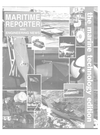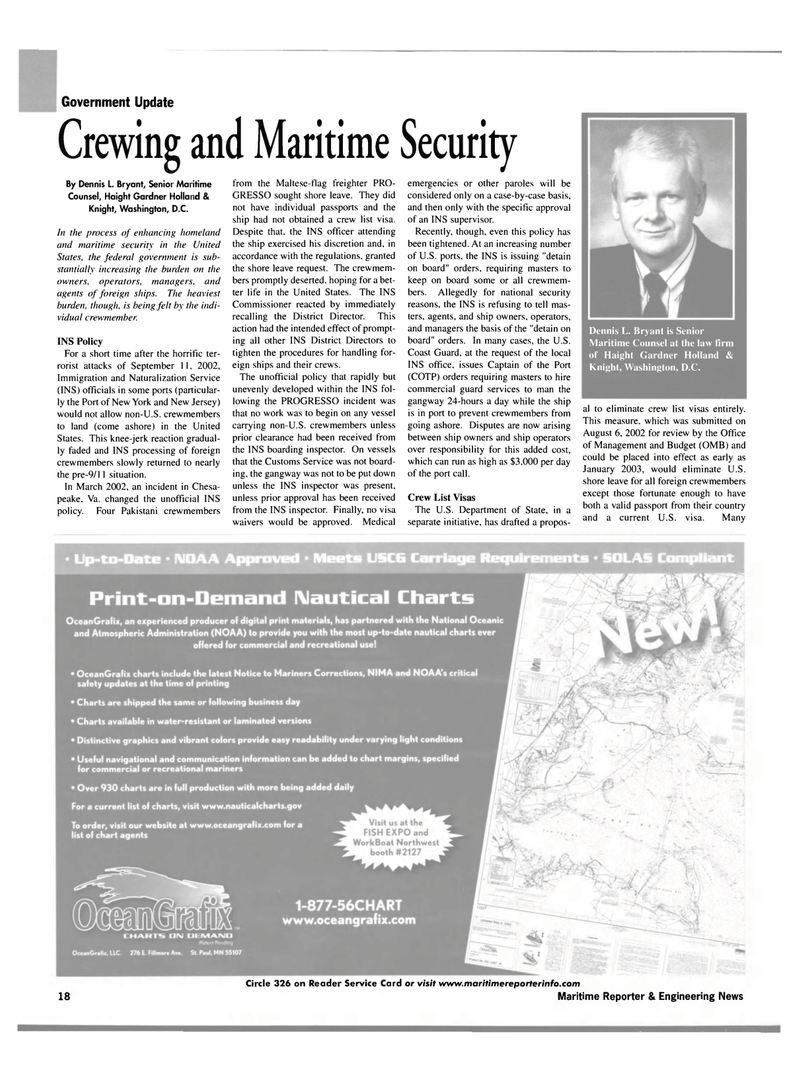
Page 16: of Maritime Reporter Magazine (September 2002)
Read this page in Pdf, Flash or Html5 edition of September 2002 Maritime Reporter Magazine
Dennis L. Bryant is Senior
Maritime Counsel at the law Arm of Haight Gardner Holland &
Knight, Washington, D.C.
Government Update
Crewing and Maritime Security
By Dennis L. Bryant, Senior Maritime
Counsel, Haight Gardner Holland &
Knight, Washington, D.C.
In the process of enhancing homeland and maritime security in the United
States, the federal government is sub- stantially increasing the burden on the owners, operators, managers, and agents of foreign ships. The heaviest burden, though, is being felt by the indi- vidual crewmember.
INS Policy
For a short time after the horrific ter- rorist attacks of September 11, 2002,
Immigration and Naturalization Service (INS) officials in some ports (particular- ly the Port of New York and New Jersey) would not allow non-U.S. crewmembers to land (come ashore) in the United
States. This knee-jerk reaction gradual- ly faded and INS processing of foreign crewmembers slowly returned to nearly the pre-9/11 situation.
In March 2002, an incident in Chesa- peake, Va. changed the unofficial INS policy. Four Pakistani crewmembers from the Maltese-flag freighter PRO-
GRESSO sought shore leave. They did not have individual passports and the ship had not obtained a crew list visa.
Despite that, the INS officer attending the ship exercised his discretion and, in accordance with the regulations, granted the shore leave request. The crewmem- bers promptly deserted, hoping for a bet- ter life in the United States. The INS
Commissioner reacted by immediately recalling the District Director. This action had the intended effect of prompt- ing all other INS District Directors to tighten the procedures for handling for- eign ships and their crews.
The unofficial policy that rapidly but unevenly developed within the INS fol- lowing the PROGRESSO incident was that no work was to begin on any vessel carrying non-U.S. crewmembers unless prior clearance had been received from the INS boarding inspector. On vessels that the Customs Service was not board- ing, the gangway was not to be put down unless the INS inspector was present, unless prior approval has been received from the INS inspector. Finally, no visa waivers would be approved. Medical emergencies or other paroles will be considered only on a case-by-case basis, and then only with the specific approval of an INS supervisor.
Recently, though, even this policy has been tightened. At an increasing number of U.S. ports, the INS is issuing "detain on board" orders, requiring masters to keep on board some or all crewmem- bers. Allegedly for national security reasons, the INS is refusing to tell mas- ters, agents, and ship owners, operators, and managers the basis of the "detain on board" orders. In many cases, the U.S.
Coast Guard, at the request of the local
INS office, issues Captain of the Port (COTP) orders requiring masters to hire commercial guard services to man the gangway 24-hours a day while the ship is in port to prevent crewmembers from going ashore. Disputes are now arising between ship owners and ship operators over responsibility for this added cost, which can run as high as $3,000 per day of the port call.
Crew List Visas
The U.S. Department of State, in a separate initiative, has drafted a propos- al to eliminate crew list visas entirely.
This measure, which was submitted on
August 6, 2002 for review by the Office of Management and Budget (OMB) and could be placed into effect as early as
January 2003, would eliminate U.S. shore leave for all foreign crewmembers except those fortunate enough to have both a valid passport from their country and a current U.S. visa. Many 18
Circle 326 on Reader Service Card or visit www.maritimereporterinfo.com
Maritime Reporter & Engineering News

 15
15

 17
17
